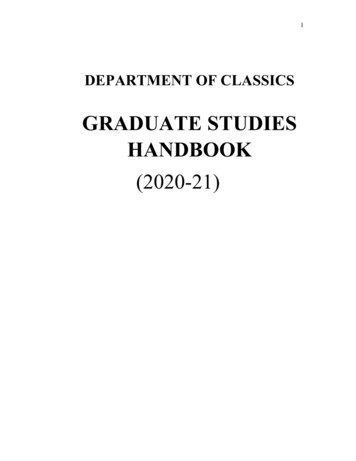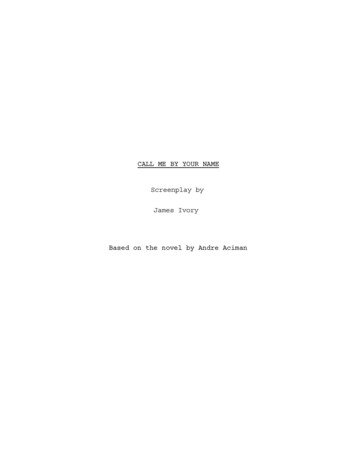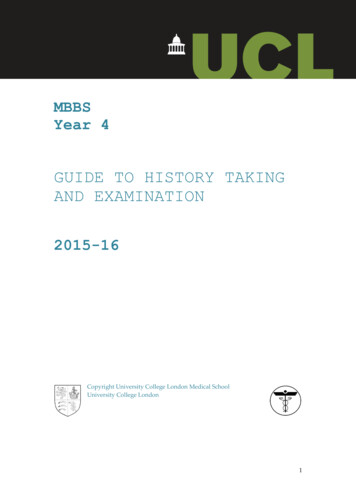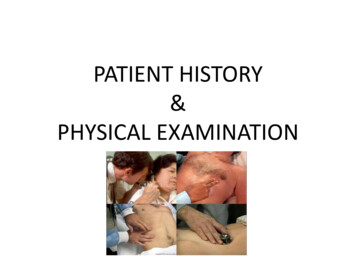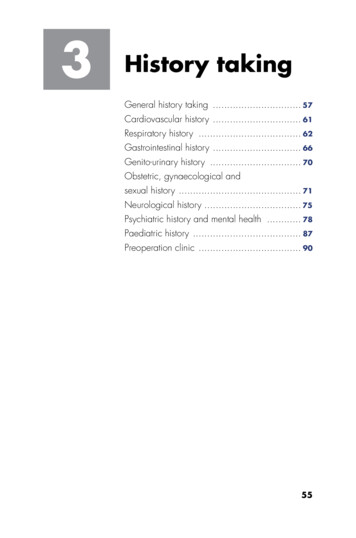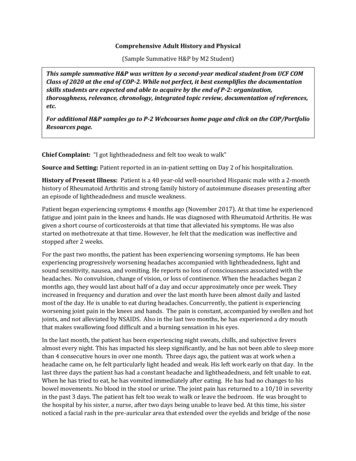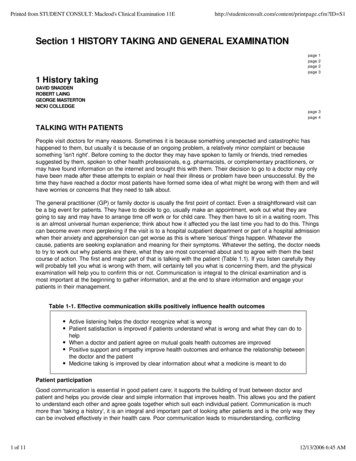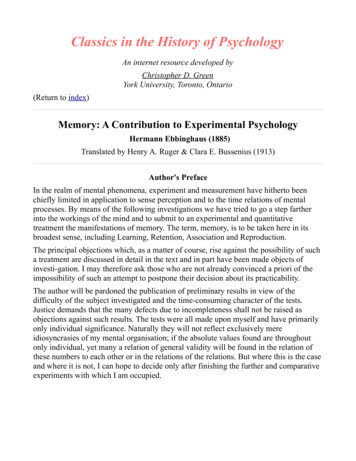
Transcription
Classics in the History of PsychologyAn internet resource developed byChristopher D. GreenYork University, Toronto, Ontario(Return to index)Memory: A Contribution to Experimental PsychologyHermann Ebbinghaus (1885)Translated by Henry A. Ruger & Clara E. Bussenius (1913)Author's PrefaceIn the realm of mental phenomena, experiment and measurement have hitherto beenchiefly limited in application to sense perception and to the time relations of mentalprocesses. By means of the following investigations we have tried to go a step fartherinto the workings of the mind and to submit to an experimental and quantitativetreatment the manifestations of memory. The term, memory, is to be taken here in itsbroadest sense, including Learning, Retention, Association and Reproduction.The principal objections which, as a matter of course, rise against the possibility of sucha treatment are discussed in detail in the text and in part have been made objects ofinvesti-gation. I may therefore ask those who are not already convinced a priori of theimpossibility of such an attempt to postpone their decision about its practicability.The author will be pardoned the publication of preliminary results in view of thedifficulty of the subject investigated and the time-consuming character of the tests.Justice demands that the many defects due to incompleteness shall not be raised asobjections against such results. The tests were all made upon myself and have primarilyonly individual significance. Naturally they will not reflect exclusively mereidiosyncrasies of my mental organisation; if the absolute values found are throughoutonly individual, yet many a relation of general validity will be found in the relation ofthese numbers to each other or in the relations of the relations. But where this is the caseand where it is not, I can hope to decide only after finishing the further and comparativeexperiments with which I am occupied.
CHAPTER IOUR KNOWLEDGE CONCERNING MEMORYSection 1. Memory in its EffectsThe language of life as well as of science in attributing a memory to the mind attemptsto point out the facts and their interpretation somewhat as follows:Mental states of every kind, -- sensations, feelings, ideas, -- which were at one timepresent in consciousness and then have disappeared from it, have not with theirdisappearance absolutely ceased to exist. Although the inwardly-turned look may nolonger be able to find them, nevertheless they have not been utterly destroyed andannulled, but in a certain manner they continue to exist, stored up, so to speak, in thememory. We cannot, of course, directly observe their present existence, but it is revealedby the effects which come to our knowledge with a certainty like that with which weinfer the existence of the stars below the horizon. These effects are of different kinds.In a first group of cases we can call back into consciousness by an exertion of the willdirected to this purpose the seemingly lost states (or, indeed, in case these consisted inimmediate sense-perceptions, we can recall their true memory images) that is, we canreproduce them voluntarily. During attempts of this sort, -- that is, attempts to recollect-- all sorts of images toward which our aim was not directed, accompany the desiredimages to the light of consciousness. Often, indeed, the latter entirely miss the goal, butas a general thing among the representations is found the one which we sought, and it isimmediately recognised as something formerly experienced. It wou1d be absurd tosuppose that our will has created it anew and, as it were, out of nothing; it must havebeen present somehow or somewhere. The will, so to speak, has only discovered it andbrought it to us again.In a second group of cases this survival is even more striking. Often, even after years,mental states once present in consciousness return to it with apparent spontaneity andwithout any act of the will; that is, they are reproduced involuntarily. Here, also, in themajority of cases we at once recognise the returned mental state as one that has alreadybeen experienced; that is, we remember it. Under certain conditions, however, thisaccompanying consciousness is lacking, and we know only indirectly that the "now"must be identical with the "then"; yet we receive in this way a no less valid proof for itsexistence during the intervening time. As more exact observation teaches us, theoccurrence of these involuntary reproductions is not an entirely random and accidentalone. On the contrary they are brought about through the instrumentality of otherimmediately present mental images. Moreover they occur in certain regular ways whichin general terms are described under the so-called 'laws of association.'Finally there is a third and large group to be reckoned with here. The vanished mentalstates give indubitable proof of their continuing existence even if they themselves do notreturn to consciousness at all, or at least not exactly at the given time. Employment of a
certain range of thought facilitates under certain conditions the employment of a similarrange of thought, even if the former does not come before the mind directly either in itsmethods or in its results. The boundless domain of the effect of accumulated experiencebelongs here. This effect results from the frequent conscious occurrence of any conditionor process, and consists in facilitating the occurrence and progress of similar processes.This effect is not fettered by the condition that the factors constituting the experienceshall return in toto to consciousness. This may incidentally be the case with a part ofthem; it must not happen to a too great extent and with too great clearness, otherwise thecourse of the present process will immediately be disturbed. Most of these experiencesremain concealed from consciousness and yet produce an effect which is significant andwhich authenticates their previous existence.Section 2. Memory in its DependenceAlong with this bare knowledge of the existence of memory and its effects, there isabundant knowledge concerning the conditions upon which depend the vitality of thatinner survival as well as the fidelity and promptness of the reproduction.How differently do different individuals behave in this respect! One retains andreproduces well; another, poorly. And not only does this comparison hold good whendifferent individuals are compared with each other, but also when different phases of theexistence of the same individual are compared: morning and evening, youth and old age,find him different in this respect.Differences in the content of the thing to be reproduced are of great influence. Melodiesmay become a source of torment by the undesired persistency of their return. Forms andcolors are not so importunate; and if they do return, it is with noticeable loss of clearnessand certainty. The musician writes for the orchestra what his inner voice sings to him;the painter rarely relies without disadvantage solely upon the images which his inner eyepresents to him; nature gives him his forms, study governs his combinations of them. Itis with something of a struggle that past states of feeling are realized; when realized, andthis is often only through the instrumentality of the movements which accompaniedthem, they are but pale shadows of themselves. Emotionally true singing is rarer thantechnically correct singing.If the two foregoing points of view are taken together -- differences in individuals anddifferences in content -- an endless number of differences come to light. One individualoverflows with poetical reminiscences, another directs symphonies from memory, whilenumbers and formulae, which come to a third without effort, slip away from the othertwo as from a polished stone.Very great is the dependence of retention and reproduction upon the intensity ofthe attention and interest which were attached to the mental states the first time theywere present. The burnt child shuns the fire, and the dog which has been beaten runs
from the whip, after a single vivid experience. People in whom we are interested wemay see daily and yet not be able to recall the color of their hair or of their eyes.Under ordinary circumstances, indeed, frequent repetitions are indispensable in order tomake possible the reproduction of a given content. Vocabularies, discourses, and poemsof any length cannot be learned by a single repetition even with the greatestconcentration of attention on the part of an individual of very great ability. By asufficient number of repetitions their final mastery is ensured, and by additional laterreproductions gain in assurance and ease is secured.Left to itself every mental content gradually loses its capacity for being revived, or atleast suffers loss in this regard under the influence of time. Facts crammed atexamination time soon vanish, if they were not sufficiently grounded by other study andlater subjected to a sufficient review. But even a thing so early and deeply founded asone's mother tongue is noticeably impaired if not used for several years.Section 3. Deficiencies in our Knowledge concerning MemoryThe foregoing sketch of our knowledge concerning memory makes no claim tocompleteness. To it might be added such a series of propositions known to psychologyas the following: "He who learns quickly also forgets quickly," "Relatively long series ofideas are retained better than relatively short ones," Old people forget most quickly thethings they learned last," and the like. Psychology is wont to make the picture rich withanecdote and illustration. But -- and this is the main point -- even if we particularise ourknowledge by a most extended use of illustrative material, everything that we can sayretains the indefinite, general, and comparative character of the propositions quotedabove. Our information comes almost exclusively from the observation of extreme andespecially striking cases. We are able to describe these quite correctly in a general wayand in vague expressions of more or less. We suppose, again quite correctly, that thesame influences exert themselves, although in a less degree, in the case of theinconspicuous, but a thousand-fold more frequent, daily activities of memory. But if ourcuriosity carries us further and we crave more specific and dependencies, both thosealready mentioned and others, -- if we put questions, so to speak, concerning their innerstructure -- our answer is silence. How does the disappearance of the ability toreproduce, forgetfulness, depend upon the length of time during which no repetitionshave taken place? What proportion does the increase in certainty of reproduction bear tothe number of repetitions? How do these relations vary with the greater or less intensityof the interest in the thing to be reproduced? These and similar questions no one cananswer.This inability does not arise from a chance neglect of investigation of these relations. Wecannot say that tomorrow, or whenever we wish to take time, we can investigate theseproblems. On the contrary this inability is inherent in the nature of the questionsthemselves. Although the conceptions in question -- namely, degrees of forgetfulness, ofcertainty and interest -- are quite correct, we have no means for establishing such
degrees in our experience except at the extremes, and even then we cannot accuratelylimit those extremes. We feel therefore that we are not at all in a condition to undertakethe investigation. We form certain conceptions during striking experiences, but wecannot find any realisation of them in the similar but less striking experiences ofeveryday life. Vice versa there are probably many conceptions which we have not as yetformed which would be serviceable and indispensable for a clear understanding of thefacts, and their theoretical mastery.The amount of detailed information which an individual has at his command and histheoretical elaborations of the same are mutually dependent; they grow in and througheach other. It is because of the indefinite and little specialised character of ourknowledge that the theories concerning the processes of memory, reproduction, andassociation have been up to the present time of so little value for a propercomprehension of those processes. For example, to express our ideas concerning theirphysical basis we use different metaphors-stored up ideas, engraved images, well-beatenpaths. There is only one thing certain about these figures of speech and that is that theyare not suitable.Of course the existence of all these deficiencies has its perfectly sufficient basis in theextraordinary difficulty and complexity of the matter. It remains to be proved whether, inspite of the clearest insight into the inadequacy of our knowledge, we shall ever makeany actual progress. Perhaps we shall always have to be resigned to this. But asomewhat greater accessibility than has so far been realised in this field cannot bedenied to it, as I hope to prove presently. If by any chance a way to a deeper penetrationinto this matter should present itself, surely, considering the significance of memory forall mental phenomena, it should be our wish to enter that path at once. For at the veryworst we should prefer to see resignation arise from the failure of earnest investigationsrather than from persistent, helpless astonishment in the face of their difficulties.
CHAPTER IITHE POSSIBILITY OF ENLARGING OUR KNOWLEDGE OF MEMORYSection 4. The Method of Natural ScienceThe method of obtaining exact measurements -- i.e., numerically exact ones -- of theinner structure of causal relations is, by virtue of its nature, of general validity. Thismethod, indeed, has been so exclusively used and so fully worked out by the naturalsciences that, as a rule, it is defined as something peculiar to them, as the method ofnatural science. To repeat, however, its 1ogical nature makes it generally applicable toall spheres of existence and phenomena. Moreover, the poss
Memory: A Contribution to Experimental Psychology Hermann Ebbinghaus (1885) Translated by Henry A. Ruger & Clara E. Bussenius (1913) Author's Preface In the realm of mental phenomena, experiment and measurement have hitherto been chiefly limited in application to sense perception and to the time relations of mental processes. By means of the following investigations we have tried to go a step .




